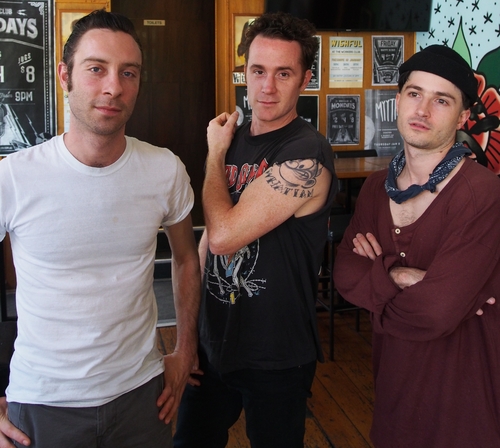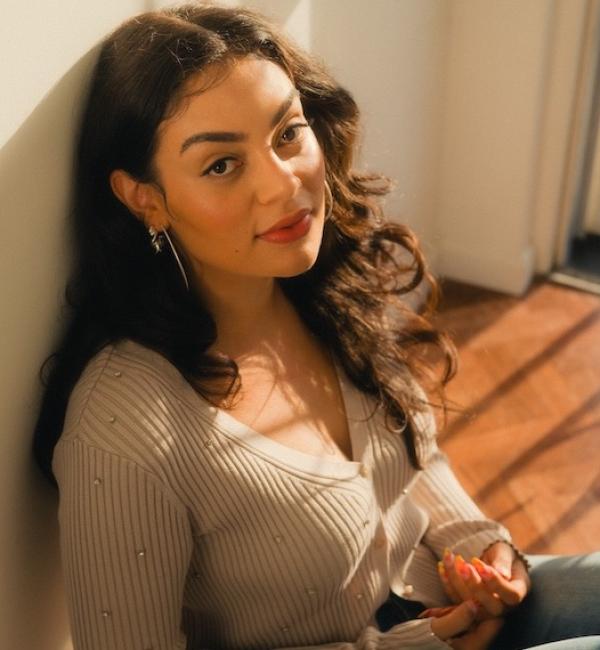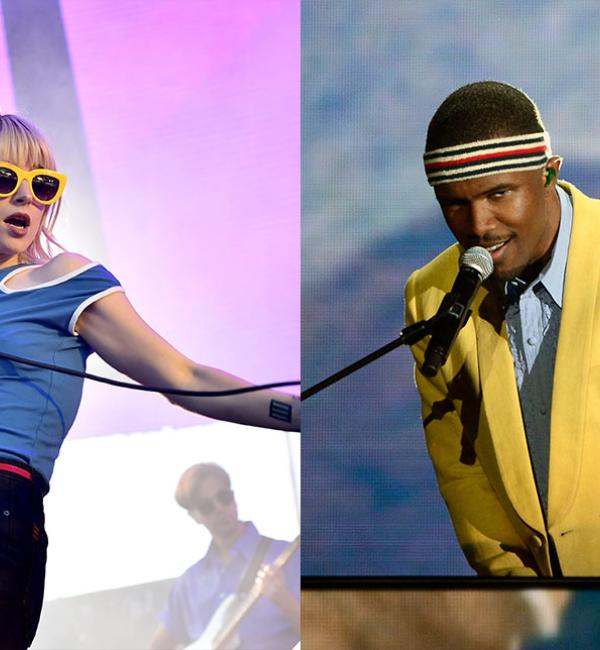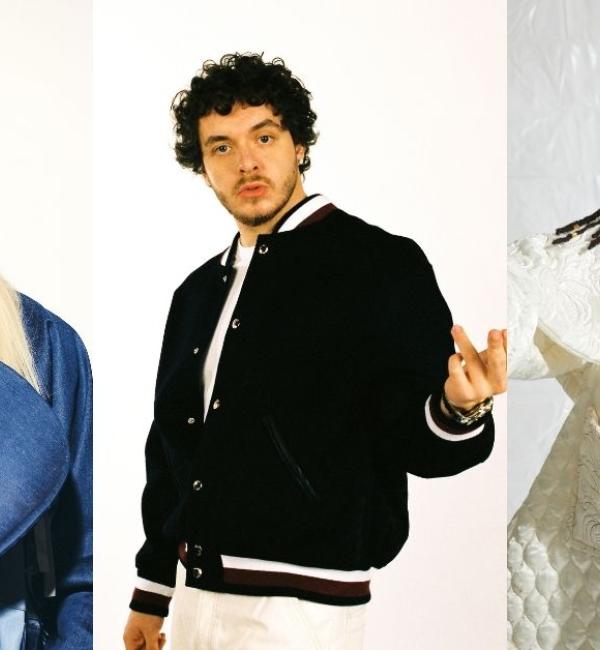
THE ONGOING MOMENT
A Conversation with Black Lips

There’s a young, blonde-haired kid being reluctantly conveyed by surrounding bodies towards the ceiling of Melbourne’s Hi-Fi Bar and Ballroom like a hysterical, low-rent Christ. He possesses the two characteristics that attend pretty much all crowdsurfers:
1. Movement that is somehow both liquid and unsmooth, a human approximation of thick soup or bad milk.
2. A huge grin wrapped over the full width of his features. (This is the ‘pretty much’ part of 'pretty much all crowdsurfers’.)
But it’s the surrounding action that’s most worthy of note. Crowdsurfers, particularly in more recent years, seem met with general irritation or even outright hostility depending on the band/venue/crowd. But each time our sandy-haired crowdsurfer plummets towards the Hifi’s floor (like at least four times) he’s merrily hoisted back onto an unstable floor of hands and further circled overhead. Noone minds. And I think noone minds mainly because of where he happens to be crowdsurfing. A goddamn Black Lips show.
Dunwoody’s own Black Lips are more than just a four-piece punk-rock band. Since their inception in the early 2000s, they’ve become a snarling embodiment of irreverence and abandon, freely sharing onstage kisses, a range of bodily fluids with the stage floor and exposed genitals with fretboards and the cheering public. The word ‘longevity’ is rarely associated with acts who lean heavily on show and shock, but 7 albums and 15 years later, Black Lips are still happily inciting mischief on stages all over the world; stages that seem to only increase in size.
Part of the reason for the unflagging popularity of Black Lips after 15 years of life—guitarist Cole Alexander reluctantly agrees—is to do with their shifting focus.
“We’ve been trying to focus more on the recorded stuff because we’ve always been known as such a live band…but over the last few records we’ve been opening our horizons and pushing a lot more.” Black Lips have long identified primarily as ‘entertainers’ rather than ‘musicians’, a designation they seem to have very actively reconfigured over the last few albums. On their latest, Underneath the Rainbow, the shift is clearly audible. This time the same over-warmed and compressed fuzz that filled 2011’s Arabia Mountain has been combed through a noticeably tighter collection of songs (‘tighter’ being, as it applies to Black Lips, a relative term). Underneath the Rainbow follows the anachronistic pattern of their output, digging further towards the roots of punk rock and unearthing a sort-of freshly-slimed rockabilly that manages, sonically and lyrically, to capture both an idealised past (“hanging on a broken t-bird hood”) and modern despair (“now that the world’s turned upside down, I’m the boy that thinks it’s funny”)
This all sounds pretty calculated. But as bassist Jared Swilley confirms, it rarely is.
“We’re never really trying to go in a progression or direction…we’ve just spent X amount of hours in the studio, so after you’ve done a bunch of stuff you have to try new things a little bit. I think it’s just more experience.”
[Author’s Note: The Band’s-Word-As-Gospel way of authenticating my claims here is more valid than you’d imagine. The fringe benefit of interviewing bands on touring schedules of an almost terrifying permanence is that they always seem to be experiencing a sort of energy flux somewhat akin to having a joint with black coffee—a state of keen interest flooded with an undercurrent of residual tiredness. This sort of restless exhaustion is kind of helpful in an interview situation because—to put it plainly—they’re basically too tired to lie, but too stimulated to stop talking completely.]
The lack of contrivance that Swilley claims has steered the Black Lips sonically seems like a governing principal for the entire band. In preparation for Underneath the Rainbow, Cole sought out collaborations with Phil Spector and Charles Manson both of which (mercifully?) fell through. Then following a drunken conversation in a hotel room with Patrick Carney of The Black Keys, Carney came on board as one of the album’s producers. Not to mention the impromptu performance with Boy George recently, or their show in Atlanta with flamboyant Houston rapper Riff Raff. Even their much-publicised tour of the Middle East in 2012 was undertaken mainly just to prove they could.
“It’s like ‘why not?’” Cole Alexander shrugs.

For bands like Black Lips who find their origins in struggle, shock and show, there is always a tension between their roots and their trajectories of success.
It’s a very public kind of attrition, something specific to rock (particularly punk) bands that grow in age, notoriety and wealth. The spontaneity of Black Lips, even in the face of increased fame and rigorous touring schedules seems to have remained very much intact.
[Author’s Note: Or tatters, depending on your attitude towards the spontaneous.]
But there’s another founding value, even more ‘at-risk’ from decay—adversity.
Adversity, particularly for punk-rock bands, is a kind of seduction. It’s a catalysing force. But what happens in the face of success? Where, like Black Lips, you have a label, are on a PR roster, can’t really play house parties anymore and are basically free from a lot of the struggles that the band was formed in the midst of, how is it possible to maintain an adversarial spirit that is, for a lot of fans (and possibly still the band’s members), what the band is all about?
“Is that something you’re even thinking about?” I stammer at Jared Swilley.
“Maybe subconsciously possibly” Swilley winces. “But we can still recreate that energy of early house shows at bigger sized clubs. its a little difficult at festivals…”
“And it’s almost more crazy sometimes” says Alexander, “because there’s a larger amount of people going crazy rather than a tiny club of like 15 people and now we’ll play in a major city and it’ll be closer to like 1000 people…”
Raw numbers aside, the focus of their reaction basically says it all. Black Lips don’t need to think about authenticity or their incipient values descending into mere window-dressing—the barometer is their fans. The band has long held that their live show is a deeply reciprocal experience; so increasing amounts of joyous fans means there’s zero problems. And they seem right to place faith in them.
“It’s funny”, says Alexander, “it’s mainly in the States but we have some full families in certain cities. Parents who have been taking their kids to our shows since they were in middle school.” Swilley nods and leans in.
“And lot of kids who are big fans of ours are like ‘you’re one of the only bands that I listen to that my parents let me play in the car’…” And this is on top of the wild 18-25 year olds that mostly populate their shows—“and sometimes way younger” Alexander admits. There’s something about the fanbase that feels way more like an extended circle of friends than a regular fanbase. And maybe it’s just how the band cultivated its fans from the beginning—like a glowing blue light, drawing all of the outsiders in.
[Author’s Note: A particularly poignant example of this is the tour following the death of the band’s second guitarist Ben Eberbaugh, killed in a car accident in 2002, not long before the release of the band’s first album. In solidarity, a multi-van convoy of around 4 vans and almost 40 people accompanied Black Lips on tour.]

Amid the post-Columbine conservatism that hung low over American high schools at the turn of the millennium, the formative members of Black Lips struggled. Back then they were (or at least Alexander and Swilley were) in the Renegades, a group more gang than band. They wore matching American flag Chuck Taylors and sported rats-tails as their haircut of choice—going so far as to cutting holes in the collars of their universally-worn denim jackets, for said rat-tails to poke through. They were kicked out of school, deemed a “subculture danger.” But not a great deal has really changed. The video for their song ‘Nightmare Field’, made for French company April 77 uses similar gang iconography (though more 50s greasers than southern tearaways) and the fundamental look of which is basically modeled on Black Lips themselves anyway. So is this the key to fan rabidity? That they were an attitude, an idea, even before they were really a band?
“It’s all encompassing and we kind of have that to go along with the music. We always started as kind of a gang and earlier shows we had small attendance but they were all pretty hard core fans. And having that aura about you definitely gets kids into it more.” Jared Swilley is sliding deeper into the couch as Cole Alexander takes over.
“Yeah it’s easier to get your music out if you have more than music. I see a lot of really great bands but they don’t really know how to sell themselves to people and have like a fan base…otherwise you’re invisible…”
On the low-lying, worn leather couch in the front bar of the Worker’s club in Fitzroy, it’s easy to guess from looking at Swilley and Alexander just how much time they’ve spent together. When they first slid into the couch at the start of the interview as I was busy shedding my belongings into a couch opposite them, they sat directly next to one another, rather than spreading over the couch’s three vacant seats. It was honestly, kind of touching as well as telling, signifying not just the length of time spent together, but the nature of it, an affection that can only be borne of marrow-deep shared experiences.
And maybe this is how adversity finally takes form. It takes form in persistence, in resilience. In coming and sitting on foreign couches with overzealous interviewers and answering their questions even though you have a sleep debt almost big enough to biologically bankrupt an entire family. In the Dunwoody of their youth, it was their environment (true to punk-rock form) that they were ‘against’. A place that Swilley admits was “an ideal breeding ground for a rock and roll band or a punk band because…it’s kind of conservative so it’s the perfect place for teenage rebellion.” Then it was personal tragedy, obscurity and hellacious touring schedules.
[Author’s Note: They must be one of the only bands that have had to reconfigure a tour away from Syria and wait a year so they could go to Iraq and Cairo (just after the Arab Spring) because it would be safer.]
And then there was their plan to build scent into their live show, to perfume entire rooms full of a smell (garbage/vomit/etc) that would forever impregnate the experience and help it live on in the memory or its participants. But Fed Ex lost their “real expensive” scent machine.
“It was kind of a pain in the ass anyways” shrugs Alexander. “You had to be in a small venue. In a big place only the front two rows would smell it.”
“The only way to succeed at life” Swilley says, “is like the most successful people and self-made billionaires…they had tonnes of failures. You’re gonna fail at some stuff…”
But Black Lips are still moving, honing their sound, scenting cassettes instead of venues and pushing into new terrain amid further lineup changes (guitarist Jack Hines struts in right at the end of the interview, replacing a recently retired Ian Saint Pé, re-hired after initially leaving the band in 2004.)
When asked about future plans, Jared Swilley adopts an understandably short gaze, recalling writing songs in their hotel room last night and muttering about “going straight back to rehearsing…for the next couple of weeks…” All of which he drawls with a smile.
Black Lips latest record Underneath The Rainbow is out now where all good records are sold | streamed.






